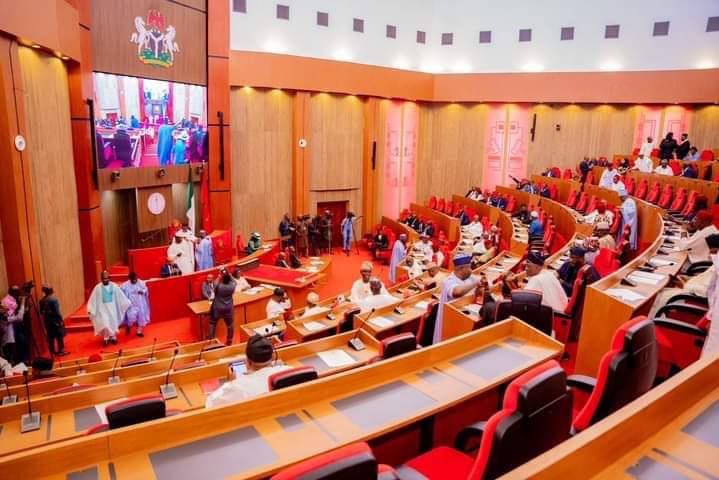In a decisive move to curb the rising tide of violence and banditry in Nigeria’s North-East and North-Central regions, the Nigerian Senate has issued an urgent directive to security agencies to scale up their surveillance and operational capacities in Taraba, Plateau, and Bauchi states. The call, made during a plenary session on May 28, 2025, comes in response to a devastating farmer-herder clash in Taraba’s Karim Lamido Local Government Area (LGA) that left a trail of destruction and loss, underscoring the growing insecurity plaguing these interconnected states.
The motion, sponsored by Senator Isa Shuaibu Lau (Taraba North), painted a grim picture of the violence that erupted on May 23, 2025, in the communities of Munga Lelau and Maigami villages. According to Senator Lau, the clash claimed between 60 and 70 lives, razed 47 homes, and displaced over 200 residents, forcing survivors to seek refuge in nearby towns. The attack, attributed to escalating tensions between farmers and herders, has spotlighted the volatile security situation in Karim Lamido, a region strategically located at the crossroads of Taraba, Plateau, and Bauchi states.
Karim Lamido’s geographic position has made it a hotspot for cross-border criminal activities, particularly banditry. Sharing boundaries with Lau and Ardo-Kola LGAs in Taraba, as well as parts of Plateau and Bauchi, the area has become a conduit for armed groups exploiting the porous borders to launch attacks and evade capture. The Senate noted that the lack of adequate security infrastructure, such as permanent camps and robust patrol systems, has allowed bandits to operate with impunity, targeting vulnerable rural communities.
“The proximity of Karim Lamido to Plateau and Bauchi states has turned it into a breeding ground for criminal elements,” Senator Lau said during the session. “These bandits move seamlessly across state lines, attacking communities, looting properties, and displacing families. Without immediate action, the situation will only worsen.”
The Senate’s resolution emphasizes the need for security agencies, including the Nigerian Police, Army, and other relevant bodies, to establish additional security camps and intensify patrols along the borders of these states. This, lawmakers argue, will enhance intelligence-gathering, deter criminal activities, and provide a rapid response mechanism to prevent further loss of life and property.
Beyond the call for heightened security, the Senate also addressed the humanitarian fallout from the recent violence. The destruction of homes and livelihoods in Munga Lelau and Maigami has left hundreds of families in dire straits, with many lacking access to food, shelter, or medical care. In response, the Senate urged the National Emergency Management Agency (NEMA) and the North-East Development Commission (NEDC) to provide immediate relief materials to the displaced. These include food supplies, medical aid, and temporary shelters to alleviate the suffering of affected communities.
The humanitarian dimension of the crisis has added urgency to the Senate’s call for action. Displaced residents, many of whom are women and children, face uncertain futures as they grapple with the loss of their homes and means of survival. The Senate’s appeal to NEMA and NEDC underscores the need for a coordinated response to address both the immediate needs of survivors and the long-term rehabilitation of affected areas.
A Broader Context of Insecurity
The violence in Karim Lamido is not an isolated incident but part of a broader wave of insecurity that has plagued Nigeria’s northern regions for years. Farmer-herder conflicts, fueled by competition over land and resources, have intensified in recent times, often exacerbated by climate change, population growth, and the proliferation of small arms. In Taraba, Plateau, and Bauchi, these clashes have taken on a deadly dimension, with entire communities caught in the crossfire.
The Senate’s directive also reflects growing frustration with the slow pace of security reforms in these regions. Despite previous government efforts to address banditry and communal violence, including the deployment of military task forces and peacebuilding initiatives, the situation remains volatile. The call for enhanced security capacities signals a recognition that current measures are insufficient to tackle the scale of the crisis.
Voices from the Ground
Residents of Karim Lamido have expressed both grief and desperation in the wake of the attacks. “We live in fear every day,” said Aisha Musa, a mother of three who fled Munga Lelau after her home was burned. “The bandits come at night, and there’s no one to protect us. We need the government to act before more lives are lost.”
Local leaders have echoed these sentiments, calling for a permanent security presence in the area. “The police and military come after the attacks, but by then, the damage is done,” said Alhaji Usman Bello, a community elder. “We need camps here, patrols here, so these criminals know they can’t just walk in and destroy our lives.”
The Senate’s resolution has sparked hope among residents and observers that decisive action will follow. However, analysts caution that implementing these measures will require significant resources and coordination among federal, state, and local authorities. The establishment of security camps, for instance, will demand not only funding but also logistical planning to ensure they are strategically placed and adequately staffed.
Moreover, addressing the root causes of the violence—such as land disputes and economic marginalization—will require a multifaceted approach that goes beyond security interventions. The Senate’s call for humanitarian aid is a step in the right direction, but long-term solutions, such as dialogue between farmers and herders and investments in rural development, will be critical to achieving lasting peace.
As Nigeria grapples with this latest wave of violence, the Senate’s directive serves as a clarion call for action in Taraba, Plateau, and Bauchi. The stakes are high: without swift and effective intervention, the cycle of bloodshed and displacement risks spiraling further out of control. For the people of Karim Lamido and surrounding areas, the hope is that this resolution will translate into tangible improvements—more security, more support, and a chance to rebuild their lives.
The Senate has also urged the public to remain vigilant and cooperate with security agencies by providing credible information to aid in the fight against banditry. As the nation watches, the coming weeks will be critical in determining whether this latest push can stem the tide of violence and bring relief to communities on the brink.
Join our Whatsapp channel to stay updated always!


